
It might be challenging to discern between the numerous forms of digital marketing that individuals employ nowadays because almost all marketing activities now take place online. Consider ecommerce marketing as an illustration. What is it, and how does it differ from strategies like social media, content marketing, search engine optimization, and email marketing?
Digital marketing is not restricted to Ecommerce Marketing. All of the above digital channels may be used by Ecommerce companies to advertise products and expand their businesses. This Ecommerce Marketing guide will look at every type of digital media out there right now.
Ecommerce marketing is the practice of generating sales by creating and enhancing awareness of a brand and the product offers of an online retailer. Ecommerce marketing in the digital sphere may use the same strategies as conventional marketing since it enables companies to capitalise on customers who are ready to make a purchase.
Ecommerce marketers use social media, digital content, search engines, and email advertising to attract customers and facilitate online sales. It entails creating campaigns to support an online business, attract clients, and grow with the appropriate inbound and digital marketing. It comprises promoting your online store as a whole or a specific product to boost sales.
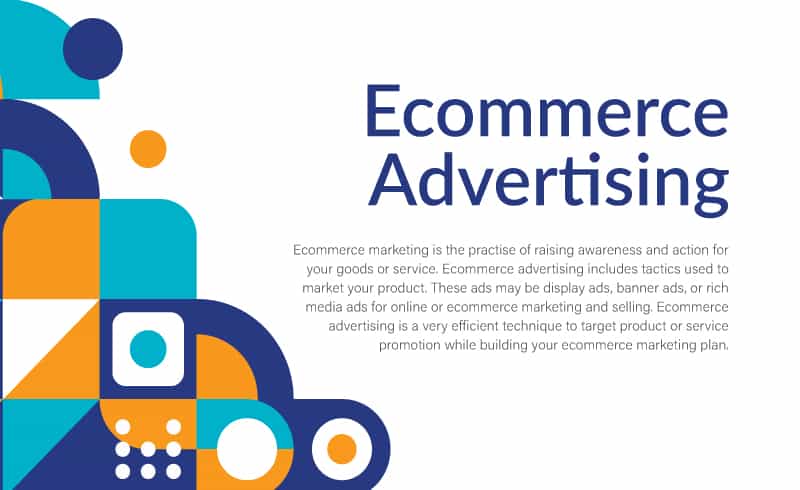
Ecommerce Marketing, as defined above, is the process of increasing awareness and action for your product or service. Meanwhile, Ecommerce Advertising encompasses the strategies used to advertise your product. These advertising may take the shape of display ads, banner ads, or rich media ads in terms of online or Ecommerce Marketing and selling. The major message here is that Ecommerce Advertising is a highly effective tool to focus your product or service promotion while establishing your Ecommerce Marketing plan.
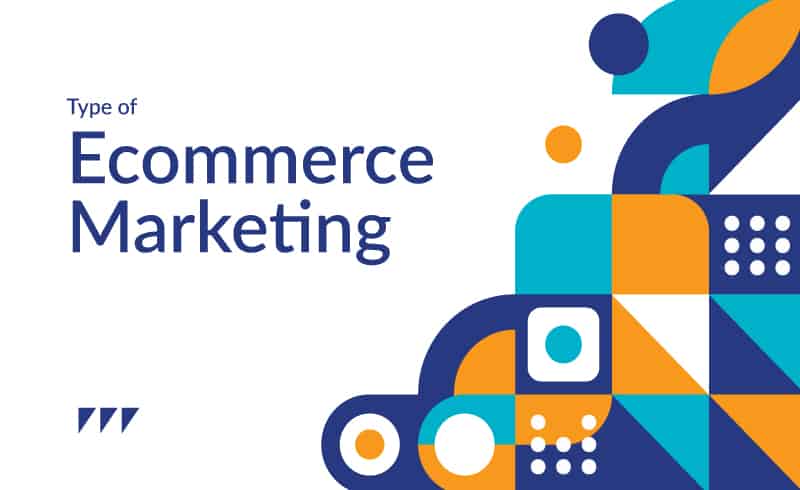
Brands, publishers, contractors, and growing businesses create social media profiles to engage their audiences. Not every social network will work for you as an Ecommerce marketer. Ecommerce websites are highly visual, thus you must use pictures to attract customers to your product pages. Instagram is an excellent medium for Ecommerce companies since you can post product photographs.
By producing shoppable content, or material that allows users to make immediate purchases, you can take your social media postings to the next level. This might range from extra tags that link visitors to a purchasing basket to carefully positioned display advertising within a social feed. You may remove friction from the purchasing process using these techniques.
Content marketing is the creation and dissemination of relevant, helpful content to present and future consumers. If done well, this content demonstrates knowledge and shows a corporation appreciates its customers. Consistent content marketing builds and maintains relationships with customers. If your audience sees your firm as a partner engaged in their success and a source of counsel and direction, they’re more inclined to buy from you.
Search engine marketing encompasses SEO and paid advertising. While SEO depends on your understanding of Google’s ranking system to improve content, SEM might comprise pay-per-click (PPC) ads, display advertisements, or product-specific ad campaigns (think Google Shopping).On Google, PPC campaigns guarantee that purchasers will see a link to your page when they search for campaign-related phrases. You pay Google each time someone clicks on your result, therefore the reward should be significant. This is why Ecommerce marketers use Google AdWords to advertise their product pages. The strategy puts searchers in front of a business’s goods when they click on a sponsored result, boosting the possibility they’ll buy before leaving the site.
Email marketing is one of the oldest kinds of digital marketing, and it has significance in Ecommerce. Email marketing’s finest feature? Automatic. Automation lets you put up an effective drip campaign to segmented subscribers by interest or stage in the buyer’s journey. It’s one marketing approach off your list. You must be careful with your email list to keep lead trust. In a time when data protection is important, not every business email is acceptable. Ecommerce marketers must carefully add website visitors to their mailing list.
Affiliates are individuals or organisations who assist in the sale of your goods online in exchange for a commission. Affiliates, unlike most social media influencers, drive product interest using traditional (but successful) marketing approaches. They frequently employ paid advertising, content marketing, and other methods to drive traffic to your product pages – it’s like having a marketing team working for you.
Local marketing is an often-overlooked approach for ecommerce firms, but it allows you to double in on the locations where most of your prospects reside (if you have a huge population of them in one area) and offers incentives to your potential client base.
Influencer marketing focuses on individuals or businesses who have a large following in your target market. The word is usually used to refer to Instagram accounts with thousands of followers, but it might also refer to a celebrity or community that your target audience follows or is a member of. People who know, like, and trust influencers form communities around them. As a result, it is simple for them to draw attention to your online goods via a recommendation or “sponsored post.”
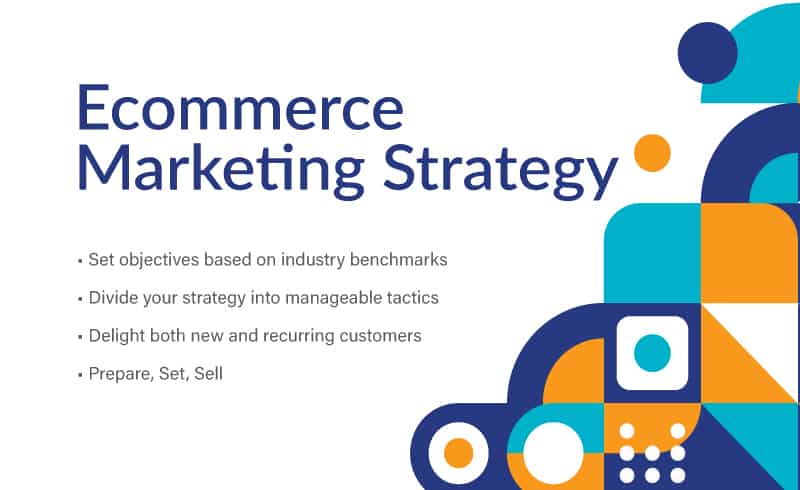
You may utilise industry benchmarks to compare your goals to certain criteria, depending on your industry, geography, business size, and a variety of other factors. Compared to comparable e-commerce companies in your industry, take into account metrics like website visits, click-through rates, conversion rates, and client acquisition costs.
There are several routes you may take when developing a marketing strategy for your online business. You may make action plans for a few of the major tactics you think will have the greatest return on investment and are the easiest for you to implement first. Let’s take an example where you opted to concentrate on a paid campaign to attract customers to your shop. You should register a Google Ads account, decide how much money you will spend on advertising, make an ad group based on your target keywords, and keep an eye on your account every day.
This might seem very simplistic, but that’s exactly how it should be. You don’t want to waste time looking for the next “amazing Ecommerce strategy” without first putting one into full operation and letting it bear fruit for you.
The marketing process doesn’t end after a sale is made. After someone signs up as a customer, you should continue to interact, nurture, and delight them. By doing this, you’ll contribute to your clients’ long-term success, which will increase loyalty. Additionally, it will encourage your customers to spread the word about you to your leads and target audience via case studies, reviews, testimonials, and word-of-mouth.
Ecommerce companies may choose from a variety of marketing strategies. You may build programmes that are intended to assist your online business in attracting clients and improving its growth by utilising digital and inbound marketing in the ideal manner.
Every year, the Ecommerce industry grows more lucrative, but this trend also encourages new sellers to enter the market and clogs up the Ecommerce marketing area. You might not be able to manage your marketing money wisely and establish the desired online presence without a set of strategies in place.
While we can’t tell you how to build your brand, we can claim that these Ecommerce marketing strategies and methods have helped merchants across a wide range of industries run very successful campaigns. Start putting some of these suggestions into effect right away to get your brand moving in the correct direction and fully optimise your digital marketing strategies.
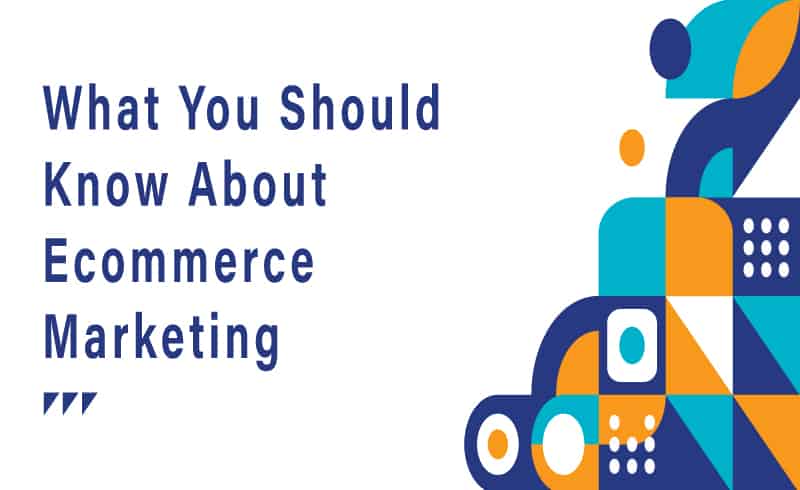
It might be challenging to discern between the numerous forms of digital marketing that individuals employ nowadays because almost all marketing activities now take place online. Consider ecommerce marketing as an illustration. What is it, and how does it differ from strategies like social media, content marketing, search engine optimization, and email marketing?
Digital marketing is not restricted to Ecommerce Marketing. All of the above digital channels may be used by Ecommerce companies to advertise products and expand their businesses. This Ecommerce Marketing guide will look at every type of digital media out there right now.
Ecommerce marketing is the practise of generating sales by creating and enhancing awareness of a brand and the product offers of an online retailer. Ecommerce marketing in the digital sphere may use the same strategies as conventional marketing since it enables companies to capitalise on customers who are ready to make a purchase.
Ecommerce marketers use social media, digital content, search engines, and email advertising to attract customers and facilitate online sales. It entails creating campaigns to support an online business, attract clients, and grow with the appropriate inbound and digital marketing. It comprises promoting your online store as a whole or a specific product to boost sales.
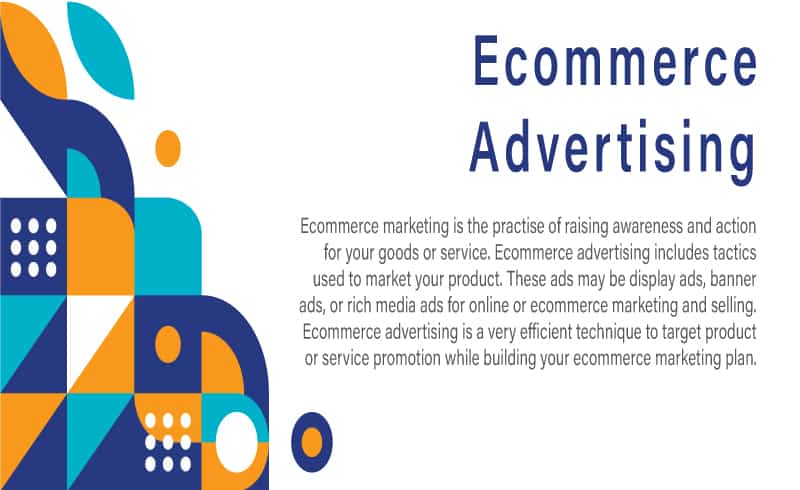
Ecommerce Marketing, as defined above, is the process of increasing awareness and action for your product or service. Meanwhile, Ecommerce Advertising encompasses the strategies used to advertise your product. These advertising may take the shape of display ads, banner ads, or rich media ads in terms of online or Ecommerce Marketing and selling. The major message here is that Ecommerce Advertising is a highly effective tool to focus your product or service promotion while establishing your Ecommerce Marketing plan.
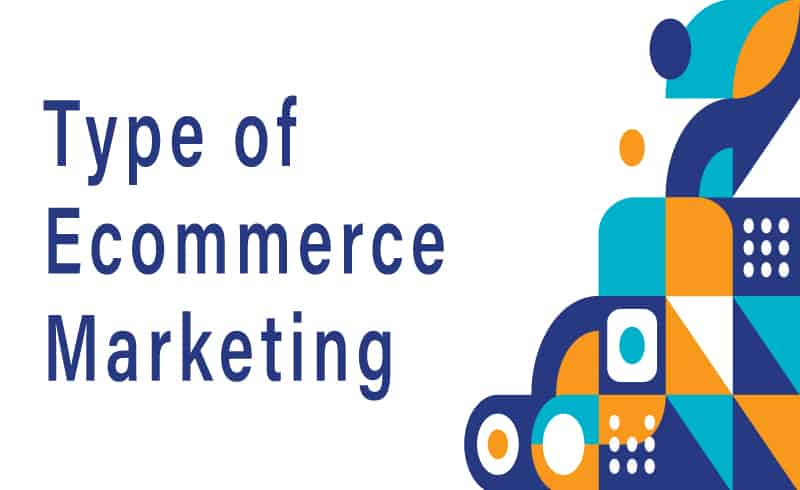
Brands, publishers, contractors, and growing businesses create social media profiles to engage their audiences. Not every social network will work for you as an Ecommerce marketer. Ecommerce websites are highly visual, thus you must use pictures to attract customers to your product pages. Instagram is an excellent medium for Ecommerce companies since you can post product photographs.
By producing shoppable content, or material that allows users to make immediate purchases, you can take your social media postings to the next level. This might range from extra tags that link visitors to a purchasing basket to carefully positioned display advertising within a social feed. You may remove friction from the purchasing process using these techniques.
Content marketing is the creation and dissemination of relevant, helpful content to present and future consumers. If done well, this content demonstrates knowledge and shows a corporation appreciates its customers. Consistent content marketing builds and maintains relationships with customers. If your audience sees your firm as a partner engaged in their success and a source of counsel and direction, they’re more inclined to buy from you.
Search engine marketing encompasses SEO and paid advertising. While SEO depends on your understanding of Google’s ranking system to improve content, SEM might comprise pay-per-click (PPC) ads, display advertisements, or product-specific ad campaigns (think Google Shopping).On Google, PPC campaigns guarantee that purchasers will see a link to your page when they search for campaign-related phrases. You pay Google each time someone clicks on your result, therefore the reward should be significant. This is why Ecommerce marketers use Google AdWords to advertise their product pages. The strategy puts searchers in front of a business’s goods when they click on a sponsored result, boosting the possibility they’ll buy before leaving the site.
Email marketing is one of the oldest kinds of digital marketing, and it has significance in Ecommerce. Email marketing’s finest feature? Automatic. Automation lets you put up an effective drip campaign to segmented subscribers by interest or stage in the buyer’s journey. It’s one marketing approach off your list. You must be careful with your email list to keep lead trust. In a time when data protection is important, not every business email is acceptable. Ecommerce marketers must carefully add website visitors to their mailing list.
Affiliates are individuals or organisations who assist in the sale of your goods online in exchange for a commission. Affiliates, unlike most social media influencers, drive product interest using traditional (but successful) marketing approaches. They frequently employ paid advertising, content marketing, and other methods to drive traffic to your product pages – it’s like having a marketing team working for you.
Local marketing is an often-overlooked approach for ecommerce firms, but it allows you to double in on the locations where most of your prospects reside (if you have a huge population of them in one area) and offers incentives to your potential client base.
Influencer marketing focuses on individuals or businesses who have a large following in your target market. The word is usually used to refer to Instagram accounts with thousands of followers, but it might also refer to a celebrity or community that your target audience follows or is a member of. People who know, like, and trust influencers form communities around them. As a result, it is simple for them to draw attention to your online goods via a recommendation or “sponsored post.”
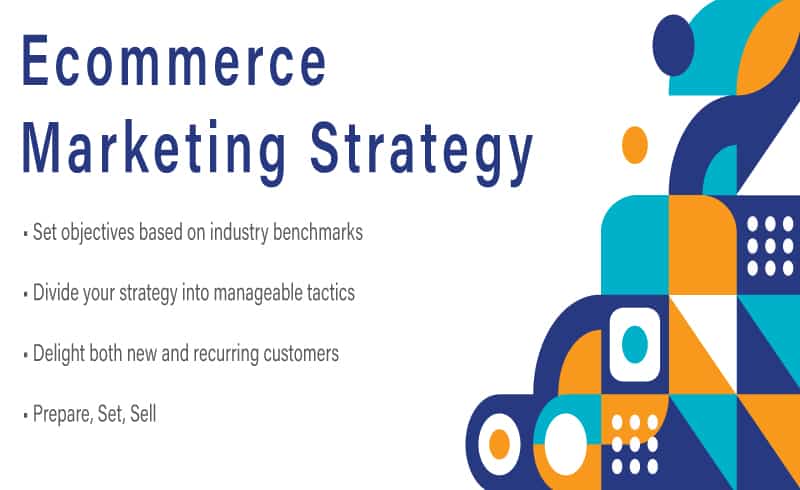
You may utilise industry benchmarks to compare your goals to certain criteria, depending on your industry, geography, business size, and a variety of other factors. Compared to comparable e-commerce companies in your industry, take into account metrics like website visits, click-through rates, conversion rates, and client acquisition costs.
There are several routes you may take when developing a marketing strategy for your online business. You may make action plans for a few of the major tactics you think will have the greatest return on investment and are the easiest for you to implement first. Let’s take an example where you opted to concentrate on a paid campaign to attract customers to your shop. You should register a Google Ads account, decide how much money you will spend on advertising, make an ad group based on your target keywords, and keep an eye on your account every day.
This might seem very simplistic, but that’s exactly how it should be. You don’t want to waste time looking for the next “amazing Ecommerce strategy” without first putting one into full operation and letting it bear fruit for you.
The marketing process doesn’t end after a sale is made. After someone signs up as a customer, you should continue to interact, nurture, and delight them. By doing this, you’ll contribute to your clients’ long-term success, which will increase loyalty. Additionally, it will encourage your customers to spread the word about you to your leads and target audience via case studies, reviews, testimonials, and word-of-mouth.
Ecommerce companies may choose from a variety of marketing strategies. You may build programmes that are intended to assist your online business in attracting clients and improving its growth by utilising digital and inbound marketing in the ideal manner.
Every year, the Ecommerce industry grows more lucrative, but this trend also encourages new sellers to enter the market and clogs up the Ecommerce marketing area. You might not be able to manage your marketing money wisely and establish the desired online presence without a set of strategies in place.
While we can’t tell you how to build your brand, we can claim that these Ecommerce marketing strategies and methods have helped merchants across a wide range of industries run very successful campaigns. Start putting some of these suggestions into effect right away to get your brand moving in the correct direction and fully optimise your digital marketing strategies.



